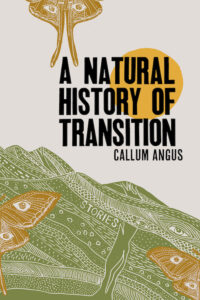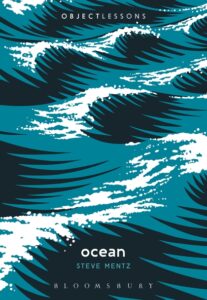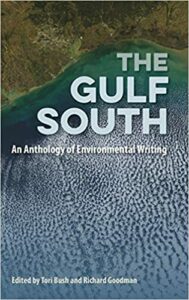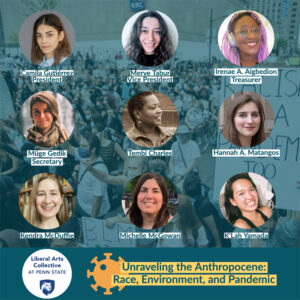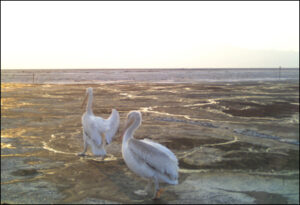We are excited to announce the lineups for our new ASLE Spotlight series launching this spring. Each of the four episodes features moderated conversations with ASLE members who have produced new critical and creative work in the environmental humanities. Episodes follow a theme, and highlight publicly engaged scholarship. If you cannot attend the live online events, they are being recorded.
A Recording of Episode 1 is below
Human/Non-Human Relations Transcript (PDF)
A Recording of Episode 2 is below
Water Works Transcript (PDF)
A Recording of Episode 3 is below
(Transcript coming soon)
A Recording of Episode 4 is below
(Transcript coming soon)
Guest Charles Pigott gratefully acknowledges the support of the Leverhulme Trust (Early Career Fellowship) and the Isaac Newton Trust
Episode 1: Human/Non-human Relations
Friday, March 19, 2021
Co-Hosts: Laura Barbas-Rhoden, Heather Swan
Featured Guests/Works:
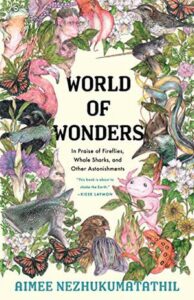 Aimee Nezhukumatathil, World of Wonders: In Praise of Fireflies, Whale Sharks, and Other Astonishments
Aimee Nezhukumatathil, World of Wonders: In Praise of Fireflies, Whale Sharks, and Other Astonishments
World of Wonders is the New York Times bestselling collection of illustrated nature essays celebrating the way plants and animals can teach, support, and inspire us, and about the lessons learned growing up as an Asian American woman. The axolotl teaches us to smile, even in the face of unkindness; the touch-me-not plant shows us how to shake off unwanted advances; the narwhal demonstrates how to survive in hostile environments. Even in the strange and the unlovely, Nezhukumatathil finds beauty and kinship. This debut nonfiction collection has been chosen as Barnes & Noble’s Book of the Year 2020, named an NPR Best Book of 2020, and a Finalist for the Kirkus Prize in non-fiction, among many other honors.
Aimee Nezhukumatathil is also the celebrated author of four books of poetry: Oceanic (Copper Canyon Press, 2018), winner of the Mississippi Institute of Arts and Letters Award; Lucky Fish (2011) winner of the gold medal for the Independent Publisher Book Awards, At the Drive-In Volcano (2007), winner of the Balcones Prize; and Miracle Fruit (2003). Her awards include a Guggenheim and an NEA fellowship. She is professor of English and teaches environmental literature and poetry writing in the MFA program of the University of Mississippi.
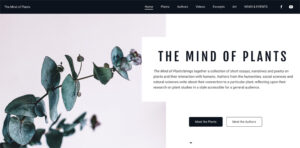 Patricia Vieira, The Mind of Plants
Patricia Vieira, The Mind of Plants
The Mind of Plants offers an accessible account of the idea of “the plant mind” by bringing together short essays, narratives and poems on plants and their interactions with humans. The texts interpret the theme broadly, from the ways that humans mind and unmind plants to the mindedness or unmindedness of plants themselves. Authors from the humanities, social sciences, and natural sciences have written about their personal connections to particular plants, reflecting upon their research on plant studies in a style amenable to a broad audience. Each of the authors has selected a plant that functions as a guiding thread to their interpretation of “the mind of plants.”
Patrícia Vieira is Professor of Spanish and Portuguese at Georgetown University and Senior Researcher at the Centre for Social Studies (CES) of the University of Coimbra. Her fields of expertise are Latin American and Iberian Literatures and Cultures, Utopian Studies and the Environmental Humanities. For more information visit: www.patriciavieira.net.
 Sarah Giragosian, The Death Spiral
Sarah Giragosian, The Death Spiral
The Death Spiral asks what it means to be a human in our age, to be at once a meddler, a tinkerer, a destroyer, a killer, as well as a rehabilitator and steward. It is addressed to those who are interested in re-thinking our role in the natural world from a position of dominance to one of co-existence and re-imagining our planetary citizenship as one defined by an ethics of responsibility towards one another, the earth, and its creatures. A product of the Anthropocene, The Death Spiral asks what is “Nature” but something of us and beyond us? It is the incarcerated bittern so isolated from her own species that she falls in love with the zoo director, the sea cucumbers slick with oil, the smokestack-studded sky, the scientist toying with the extinct mammoth’s DNA. However, the collection also looks for and finds examples of resilience in the wildlife around us.
 Sarah Giragosian is the author of the poetry collections Queer Fish (winner of the American Poetry Journal Book Prize, 2017) and The Death Spiral (Black Lawrence Press, 2020), as well as co-editor, with Virginia Konchan of Marbles on the Floor: How to Assemble a Book of Poems (University of Akron Press, forthcoming). She teaches at the University at Albany-SUNY.
Sarah Giragosian is the author of the poetry collections Queer Fish (winner of the American Poetry Journal Book Prize, 2017) and The Death Spiral (Black Lawrence Press, 2020), as well as co-editor, with Virginia Konchan of Marbles on the Floor: How to Assemble a Book of Poems (University of Akron Press, forthcoming). She teaches at the University at Albany-SUNY.
Callum Angus, A Natural History of Transition
A Natural History of Transition is a collection of short stories that disrupts the notion that trans people can only have one transformation. Like the landscape studied over eons, change does not have an expiration date for these trans characters, who grow as tall as buildings, turn into mountains, unravel hometown mysteries, and give birth to cocoons. Portland-based author Callum Angus infuses his work with a mix of alternative history, horror, and a reality heavily dosed with magic.
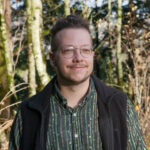 Callum Angus is a trans writer and editor currently based in Portland, Oregon. His work has appeared in Nat. Brut, West Branch, LA Review of Books, Catapult, The Common, Seventh Wave Magazine and elsewhere. He has received support from Lambda Literary and Signal Fire Foundation for the Arts, and he holds an MFA from the University of Massachusetts Amherst. He edits the journal smoke and mold, and his first book of stories, A Natural History of Transition, is forthcoming from Metonymy Press in April 2021.
Callum Angus is a trans writer and editor currently based in Portland, Oregon. His work has appeared in Nat. Brut, West Branch, LA Review of Books, Catapult, The Common, Seventh Wave Magazine and elsewhere. He has received support from Lambda Literary and Signal Fire Foundation for the Arts, and he holds an MFA from the University of Massachusetts Amherst. He edits the journal smoke and mold, and his first book of stories, A Natural History of Transition, is forthcoming from Metonymy Press in April 2021.
Episode 2: Water Works
Friday, April 16, 2021
Co-Hosts: Bethany Wiggin, Melody Jue
Featured Guests/Works:
The ocean comprises the largest object on our planet. Retelling human history from an oceanic rather than terrestrial point of view unsettles our relationship with the more than human world. Human engagements with the world’s ocean can be destructive, as with today’s deluges of plastic trash and acidification, but the mismatch between small bodies and vast seas also emphasizes the frailty and resilience of human experience. From ancient stories of shipwrecked sailors to the containerized future of twenty-first century commerce, Ocean splashes the histories we thought we knew into  salty and unfamiliar places.
salty and unfamiliar places.
Steve Mentz is Professor of English at St. John’s University in New York City. His most recent books are Ocean (2020), Break Up the Anthropocene (2019), and Shipwreck Modernity (2015).
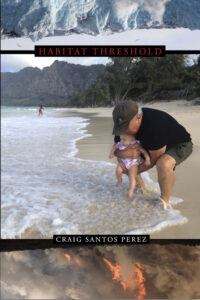 Craig Santos Perez, Habitat Threshhold
Craig Santos Perez, Habitat Threshhold
With Habitat Threshhold, Craig Santos Perez has crafted a timely collection of eco-poetry that explores his ancestry as a native Pacific Islander, the ecological plight of his homeland, and his fears for the future. The book begins with the birth of the author’s daughter, capturing her growth and childlike awe at the wonders of nature. As it progresses, Perez confronts the impacts of environmental injustice, the ravages of global capitalism, toxic waste, animal extinction, water rights, human violence, mass migration, and climate change. Throughout, he mourns lost habitats and species, and confronts his fears for the future world his daughter will inherit. Amid meditations on calamity, this work does not stop at the threshold of elegy. Instead, the poet envisions a sustainable future in which our ethics are shaped by the indigenous belief that the earth is sacred and all beings are interconnected—a  future in which we cultivate love and “carry each other towards the horizon of care.”
future in which we cultivate love and “carry each other towards the horizon of care.”
Craig Santos Perez is an indigenous Chamoru poet from the Pacific Island of Guåhan (Guam). He is the author of five books of poetry, and a professor in the English department at the University of Hawai’i, Mānoa.
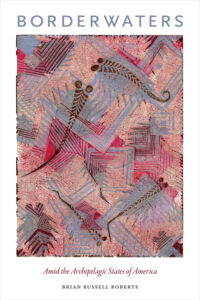 Brian Russell Roberts, Borderwaters: Amid the Archipelagic States of America
Brian Russell Roberts, Borderwaters: Amid the Archipelagic States of America
Conventional narratives describe the United States as a continental country bordered by Canada and Mexico. Yet, since the late twentieth century the United States has claimed more water space than land space, and more water space than perhaps any other country in the world. This watery version of the United States borders some twenty-one countries, particularly in the archipelagoes of the Pacific and the Caribbean. In Borderwaters Brian Russell Roberts dispels continental national mythologies to advance an alternative image of the United States as an archipelagic nation. Drawing on literature, visual art, and other expressive forms that range from short stories about the afterlife of single-use plastic to Indigenous testimonies against nuclear testing, Roberts remaps both the fundamentals of US geography and the foundations of how we discuss US culture.
 Brian Russell Roberts is Professor of English and Director of American Studies at Brigham Young University. In addition to Borderwaters, his recent publications include the coedited collections Archipelagic American Studies (2017, with Michelle Ann Stephens) and Indonesian Notebook: A Sourcebook on Richard Wright and the Bandung Conference (2016, with Keith Foulcher).
Brian Russell Roberts is Professor of English and Director of American Studies at Brigham Young University. In addition to Borderwaters, his recent publications include the coedited collections Archipelagic American Studies (2017, with Michelle Ann Stephens) and Indonesian Notebook: A Sourcebook on Richard Wright and the Bandung Conference (2016, with Keith Foulcher).
Tori Bush, The Gulf South: An Anthology of Environmental Writing
The first collection of environmental writing about the Gulf South region, this volume features a diverse array of voices from the past 100 years. The work of these writers and artists enriches how we understand and represent the relationship between people and the rapidly changing ecology of the Gulf. Reaching from Texas to Florida, this anthology presents pieces from a variety of genres, from journalism to poetry to memoir to a graphic nonfiction book. The subjects include natural and human-made disasters, the impact of industry, influential historical events, personal encounters with the environment, and a deep love for the land and water by the people who live there. Reflecting a range of different landscapes and their inhabitants, and emphasizing the human voice and condition throughout, The Gulf South: An Anthology of Environmental Writing brings to light a region whose influence on American commerce and culture reaches far beyond its geographical boundaries. This volume encourages readers to consider how we choose to characterize the environment and its degradation through language, and how these accounts affect our thinking and planning for the future.
 Tori Bush is a PhD Candidate and instructor at Louisiana State University. Her dissertation “Eco-Orientalism: Constructing Climate Migration” is an interdisciplinary investigation into how the very small island of Isle de Jean Charles has been constructed through a white western lens of literature, media, and other cultural objects as an environmental sacrifice zone, or “eco-orientalized,” in order to experiment with processes and procedure of climate migration in the United States.
Tori Bush is a PhD Candidate and instructor at Louisiana State University. Her dissertation “Eco-Orientalism: Constructing Climate Migration” is an interdisciplinary investigation into how the very small island of Isle de Jean Charles has been constructed through a white western lens of literature, media, and other cultural objects as an environmental sacrifice zone, or “eco-orientalized,” in order to experiment with processes and procedure of climate migration in the United States.
Episode 3: A Sense of Urgency
Friday, May 14, 2021
Co-Hosts: April Anson, Rahul Mukherjee
Featured Guests/Works:
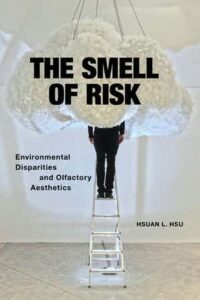 Hsuan L. Hsu, The Smell of Risk: Environmental Disparities and Olfactory Aesthetics
Hsuan L. Hsu, The Smell of Risk: Environmental Disparities and Olfactory Aesthetics
Smell has long been spurned by Western aesthetics as a lesser sense for its qualities of subjectivity, volatility, and materiality. But it is these very qualities that make olfaction a vital tool for sensing and staging environmental risk and inequality. Unlike the other senses, smell extends across space and reaches into our bodies. Hsu traces how writers, artists, and activists have deployed these embodied, biochemical qualities of smell in their efforts to critique and reshape modernity’s olfactory disparities. Drawing on ecocriticism, geography, sensory studies and critical race studies, The Smell of Risk develops a 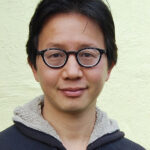 framework for understanding modernity’s differentiated olfactory ecologies.
framework for understanding modernity’s differentiated olfactory ecologies.
Hsuan L. Hsu is a Professor of English at the University of California, Davis working in the areas of American Literature, cultural geography, critical ethnic studies, sensory studies, and the environmental humanities. He is currently working on a project about racial disparities in air conditioning, thermoception, and affect.
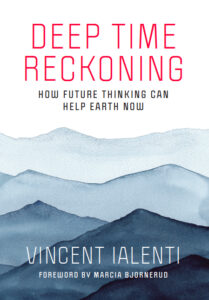 Vincent Ialenti, Deep Time Reckoning: How Future Thinking Can Help Earth Now
Vincent Ialenti, Deep Time Reckoning: How Future Thinking Can Help Earth Now
Finland’s Olkiluoto nuclear waste repository “safety case” experts have spent decades forecasting ecological and geophysical events that could, potentially, occur over the coming tens or hundreds of thousands of years. They have developed models of distant future glaciations, climate changes, earthquakes, and human-animal relationships. Drawing upon 32-months of anthropological fieldwork, Deep Time Reckoning (MIT Press 2020) explores how these experts distilled fragmentary series of hopes, calculations, fears, datasets, dreams, models, and anxieties about Finland’s socio-ecological futures into mundane artifacts of technocratic paperwork. With these futurities in view, the book suggests imaginative exercises – “reckonings” – for expanding one’s intellectual time horizons during a moment of Anthropocene political, ecological, and epistemic crisis.
 Vincent Ialenti is an Assistant Research Professor at George Washington University’s Elliott School of International Affairs, and a MacArthur Postdoctoral Fellow at University of British Columbia. Vincent’s research has been supported by the U.S. National Science Foundation, The Mellon Foundation, and The MacArthur Foundation. He has published in Social Studies of Science, Journal of the Royal Anthropological Institute, Physics Today, and Bulletin of the Atomic Scientists. Alongside his academic work, Vincent has written for NPR, Forbes, BBC Future, Atlas Obscura, and other public outlets. He holds a PhD in Sociocultural Anthropology from Cornell University and a MSc in Law, Anthropology & Society from the London School of Economics.
Vincent Ialenti is an Assistant Research Professor at George Washington University’s Elliott School of International Affairs, and a MacArthur Postdoctoral Fellow at University of British Columbia. Vincent’s research has been supported by the U.S. National Science Foundation, The Mellon Foundation, and The MacArthur Foundation. He has published in Social Studies of Science, Journal of the Royal Anthropological Institute, Physics Today, and Bulletin of the Atomic Scientists. Alongside his academic work, Vincent has written for NPR, Forbes, BBC Future, Atlas Obscura, and other public outlets. He holds a PhD in Sociocultural Anthropology from Cornell University and a MSc in Law, Anthropology & Society from the London School of Economics.
Liberal Arts Collective at The Pennsylvania State University, “Unraveling the Anthropocene: Race, Environment, and Pandemic”
Unraveling the Anthropocene: Race, Environment, and Pandemic is a podcast series in which the Liberal Arts Collective interviews academics, activists, and artists who are working to understand or document the crises that describe our contemporary moment. In our discussions, we address how global ecological crises both impact and are impacted by political turmoil, widespread outbreaks of infectious disease, and racial violence.
 Müge Gedik will represent the LAC; she is a second-year M.A. student in Comparative Literature at the Pennsylvania State University. Her interests include modern Turkish, Latin American, and global Anglophone literatures, feminist theory, postcolonial theory and decolonization, ecocriticism, and environmental humanities. Her master’s research explores contemporary climate fiction from Turkey and Cuba within a critical framework of the Anthropocene.
Müge Gedik will represent the LAC; she is a second-year M.A. student in Comparative Literature at the Pennsylvania State University. Her interests include modern Turkish, Latin American, and global Anglophone literatures, feminist theory, postcolonial theory and decolonization, ecocriticism, and environmental humanities. Her master’s research explores contemporary climate fiction from Turkey and Cuba within a critical framework of the Anthropocene.
Gretchen E. Henderson, Life in the Tar Seeps
At Great Salt Lake near Robert Smithson’s earthwork of Spiral Jetty (1970), a motley crew of scientists repeatedly walk the mudflats to study fossils in the making. In this spare, desolate landscape, an intricate web of life unfurls: through shifting lake levels, bird migrations, microbial studies, environmental arts, and cultural histories shaped by Indigenous knowledges, overwritten by colonial legacies that persist in environmental threats. This reputedly dead sea holds “death traps” of tar seeps, or pools of raw oil, that stick together pressing questions in the climate crisis. How do we cultivate care for challenging places? How do we move beyond narrow concepts of beauty and ugliness to care for ecosystems that evolve over time? How do we confront our mortality and vulnerability to recognize kindred dynamics in our living planet? Henderson came to the tar seeps (natural asphalt) after recovering from being hit by a car while walking in a crosswalk (manmade asphalt). Like the spiraling artwork beside the tar seeps, associations of life and death, degeneration and regeneration, injury and healing, congeal for her in Life in the Tar Seeps. As she witnesses scientists, artistic curators, land managers, and students who work collaboratively to steward a challenging place, she grows to see the lake not as dead but as a watershed for shifting perceptions of any overlooked place.
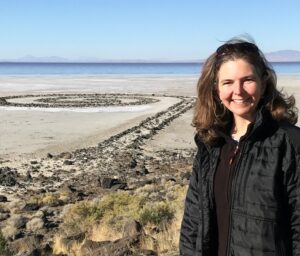 Gretchen E. Henderson is Associate Director for Research at the Harry Ransom Center at The University of Texas at Austin and the author of four books, along with arts media and opera libretti. In 2018-2019, she was the Annie Clark Tanner Fellow in Environmental Humanities at the University of Utah, with recent writing published in Ecotone, Ploughshares, Kenyon Review, and Nature Sustainability. Her book on Life in the Tar Seeps is forthcoming from Trinity University Press.
Gretchen E. Henderson is Associate Director for Research at the Harry Ransom Center at The University of Texas at Austin and the author of four books, along with arts media and opera libretti. In 2018-2019, she was the Annie Clark Tanner Fellow in Environmental Humanities at the University of Utah, with recent writing published in Ecotone, Ploughshares, Kenyon Review, and Nature Sustainability. Her book on Life in the Tar Seeps is forthcoming from Trinity University Press.
Episode 4: Identity and Place
Friday, June 11, 2021
Co-Hosts: Laura Barbas-Rhoden, Gisela Heffes
Featured Guests/Works:
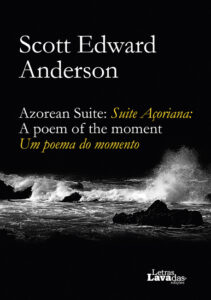 Scott Edward Anderson, Azorean Suite: A Poem of the Moment/Suite Açoriana: Um Poema do Momento
Scott Edward Anderson, Azorean Suite: A Poem of the Moment/Suite Açoriana: Um Poema do Momento
“One can be born on an island in two ways,” wrote the poet and novelist Eduardo Bettencourt Pinto. “From the body of a woman or from the radiance of sensibility.” In this bilingual, book-length poem, Azorean Suite/Suite Açoriana, award-winning poet Scott Edward Anderson explores the nature of what it’s like to be born from that radiance of sensibility of his ancestral islands. Using autobiographical elements as well as quotations from Azorean poets, scientists, and naturalists, Anderson extends the limits  of personal history and expands the poet’s emotional journey.
of personal history and expands the poet’s emotional journey.
Scott Edward Anderson is the author of Azorean Suite/Suite Açoriana (2020), Falling Up: A Memoir of Second Chances (2019), which recently received the 1st Literary Award of Letras Lavadas in conjunction with PEN Açores, the Nautilus Award-winning Dwelling: an ecopoem (2018), Fallow Field: Poems (2013), and Walks in Nature’s Empire (1995).
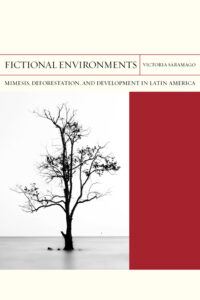 Victoria Saramago, Fictional Environments: Mimesis, Deforestation, and Development in Latin America
Victoria Saramago, Fictional Environments: Mimesis, Deforestation, and Development in Latin America
Fictional Environments: Mimesis, Deforestation, and Development in Latin America investigates how fictional works have become sites for the production of knowledge, imagination, and intervention in Latin American environments. It investigates the dynamic relationship between fictional images and real places, as the lasting representations of forests, rural areas, and deserts in novels clash with collective perceptions of changes like deforestation and urbanization.
From the backlands of Brazil to a developing Rio de Janeiro, and from the rainforests of Venezuela and Peru to the Mexican countryside, rapid deforestation took place in Latin America in the second half of the twentieth century. How do fictional works and other cultural objects dramatize, resist, and intervene in these ecological transformations? Through analyses of work by João Guimarães Rosa, Alejo Carpentier, Juan Rulfo, Clarice Lispector, and Mario Vargas Llosa, Victoria Saramago shows how novels have inspired conservationist initiatives and offered counterpoints to developmentalist policies, and how environmental concerns have informed the agendas of novelists as essayists, politicians, and public intellectuals. This book seeks to understand the role of literary representation, or mimesis, in shaping, sustaining, and negotiating environmental imaginaries during the deep, ongoing transformations that have taken place from the 1950s to the present.
 Victoria Saramago is an assistant professor of Hispanic and Luso-Brazilian studies at the University of Chicago. She is a member of the executive committee of the Modern Language Association’s Luso-Brazilian Forum, and a member of the Brazilian Studies Association executive committee. Her articles have appeared or are forthcoming in Novel: A Forum on Fiction, Luso-Brazilian Review, Ecozon@: European Journal of Literature, Culture, and Environment, Letterature d’America, Portuguese Literary and Cultural Studies, Nuevo Texto Crítico, and others.
Victoria Saramago is an assistant professor of Hispanic and Luso-Brazilian studies at the University of Chicago. She is a member of the executive committee of the Modern Language Association’s Luso-Brazilian Forum, and a member of the Brazilian Studies Association executive committee. Her articles have appeared or are forthcoming in Novel: A Forum on Fiction, Luso-Brazilian Review, Ecozon@: European Journal of Literature, Culture, and Environment, Letterature d’America, Portuguese Literary and Cultural Studies, Nuevo Texto Crítico, and others.
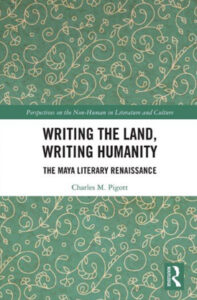 Charles Maurice Pigott, Writing the Land, Writing Humanity: The Maya Literary Renaissance
Charles Maurice Pigott, Writing the Land, Writing Humanity: The Maya Literary Renaissance
The Maya Literary Renaissance is a growing yet little-known literary phenomenon that can redefine our understanding of “literature” universally. By analyzing eight representative texts of this new and vibrant literary movement, the book argues that the texts present literature as a trans-species phenomenon that is not reducible only to human creativity. Based on detailed textual analysis of the literature in both Maya and Spanish as well as first-hand conversations with the writers themselves, Writing the Land, Writing Humanity, develops the first conceptual map of how literature constantly emerges from wider creative patterns in nature. This process, defined as literary inhabitation, is explained by synthesizing core Maya cultural concepts with diverse philosophical, literary, anthropological and biological theories. In the context of the Yucatan Peninsula, where the texts come from, literary inhabitation is presented as an integral part of bioregional becoming, the evolution of the Peninsula as a constantly unfolding dialogue.
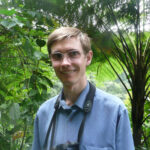 Charles M. Pigott is Associate Professor of Literature and Humanities at Universidad de las Américas Puebla in Mexico, Quondam Fellow of Hughes Hall (University of Cambridge) and Research Associate of Centre of Latin American Studies (University of Cambridge). His research explores environmental philosophies in Latin American indigenous literature, taking an interdisciplinary and translinguistic perspective in an effort to create a shared framework for the conservation of ecological, cultural and linguistic diversity.
Charles M. Pigott is Associate Professor of Literature and Humanities at Universidad de las Américas Puebla in Mexico, Quondam Fellow of Hughes Hall (University of Cambridge) and Research Associate of Centre of Latin American Studies (University of Cambridge). His research explores environmental philosophies in Latin American indigenous literature, taking an interdisciplinary and translinguistic perspective in an effort to create a shared framework for the conservation of ecological, cultural and linguistic diversity.
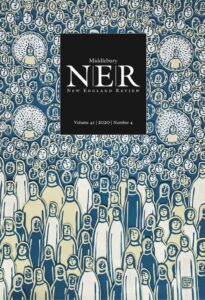 Lucien Darjeun Meadows, “Circling Eloh: A Meditation”
Lucien Darjeun Meadows, “Circling Eloh: A Meditation”
“Circling Eloh” is a lyric ethnographic essay revolving around histories of environmental trauma and reclamation. Focusing on the Colorado-Big Thompson Project (one of the US Bureau of Reclamation’s largest water diversion projects) and the creation of the Horsetooth Reservoir via, in part, the flooding of a town, this essay uses long-distance running to spiral around resonant histories of environmental survivance in Appalachia. What parallels exist between the erasure and flooding of a small Colorado town, and the coal disasters and flooding of Appalachian communities? Between memories physically erased through partial archives, and those psychologically erased through active forgetting? By shifting between critical research on the Bureau of Reclamation, environmental legislation, and ancestral and personal memories of flood and confinement as a working-class Cherokee, Lucien facilitates a meditation on these questions and their possibilities.
 Lucien Darjeun Meadows is an English, German, and Cherokee writer born and raised in the Appalachian Mountains. He has received fellowships and awards from the Academy of American Poets, American Alliance of Museums, National Association for Interpretation, and University of Denver, where he is working toward his PhD.
Lucien Darjeun Meadows is an English, German, and Cherokee writer born and raised in the Appalachian Mountains. He has received fellowships and awards from the Academy of American Poets, American Alliance of Museums, National Association for Interpretation, and University of Denver, where he is working toward his PhD.


